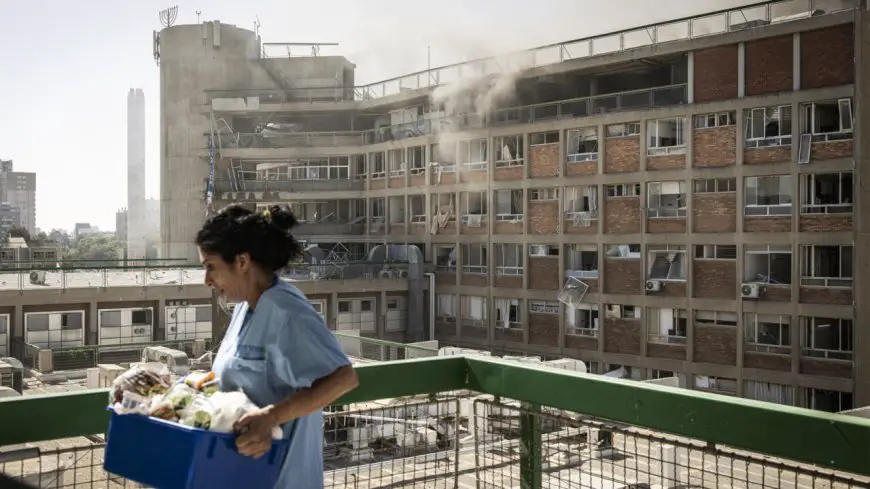Collateral Devastation: How Iran’s Missile Strikes Are Tearing Through Israeli Hospitals and Civilians
Iran’s missile strike on Soroka Hospital in southern Israel killed 17 and injured dozens. Explore the human cost, legal implications, and global response.

The Escalating Toll of War on the Innocent
As the Iran-Israel conflict deepens, the latest missile barrage has marked a chilling new phase in modern warfare—one where hospitals are no longer sanctuaries, and civilians have become front-line targets. On June 18, Iranian ballistic missiles struck southern Israel, with the Soroka Medical Center in Be'er Sheva reportedly among the key targets. The attack killed at least 17 people and injured over 60, many of whom were patients and medical staff.
The international community has responded with alarm, while Israeli citizens are grappling with a mix of fear, grief, and growing anger. The human cost of this escalation is staggering—and it’s raising serious questions about the legality of such strikes and their long-term consequences.
Soroka Hospital Under Fire: What Happened?
On the night of June 18, multiple Fateh-110 missiles fired from Iranian territory bypassed Israel’s Iron Dome defense system. One of them hit a parking structure adjacent to the Soroka University Medical Center, the largest trauma hospital in southern Israel. The blast caused partial collapses in nearby wings, damaged critical infrastructure, and left the emergency department operating in crisis mode.
“This wasn’t just a missile strike—it was an attack on our lifeline. We had patients undergoing surgery when the building trembled,” said Dr. Yael Ben-Ami, a senior surgeon at Soroka.
According to The Guardian’s live report, the Israeli military later confirmed the missile was fired from Iranian soil, not from proxy forces. This marks a dangerous escalation—one where state actors openly target civilian infrastructure.
Casualties, Trauma, and the Human Fallout
Initial reports indicate 17 fatalities, including four healthcare workers and three children. Over 60 others sustained injuries, with many still in critical condition.
Beyond the physical toll, the psychological trauma is immense. Families were forced to evacuate in the dark. ICU patients were wheeled out mid-treatment. Pediatric wards were turned into triage zones.
“We’re trying to stay strong, but how do you explain to your 6-year-old why his doctor died in the same bed he was treated in?” said Shira Levin, a mother of a child patient.
Civil defense shelters are overwhelmed, and schools in Be'er Sheva remain closed. As the conflict intensifies, Israeli emergency services are bracing for repeated strikes on civilian sites—fearing that no place is truly off-limits anymore.
Legal Implications: War Crime or Military Strategy?
Under International Humanitarian Law (IHL), medical facilities enjoy special protection. The Geneva Conventions explicitly prohibit attacks on hospitals unless they are being used for military purposes—and even then, only under strict conditions.
Human rights organizations like Human Rights Watch have already called for a formal investigation into the Soroka incident.
“This strike could constitute a war crime,” said a legal expert from Amnesty International. “Even if Israel is a combatant, targeting a hospital without definitive evidence of military use is unlawful and reprehensible.”
Meanwhile, the United Nations Security Council has scheduled an emergency meeting to assess whether the attack violates Articles 8(2)(b)(ix) of the Rome Statute, which defines war crimes related to humanitarian installations.
Israel’s Response and Civilian Reactions
In retaliation, Israeli forces struck suspected Iranian missile facilities near Arak, targeting the Khondab heavy water nuclear site. However, officials have maintained that unlike Iran, they aim to avoid civilian casualties.
Domestically, the Israeli public is demanding stronger defense capabilities. Over 120,000 citizens have signed a petition urging the government to install additional Iron Dome batteries in the Negev and southern districts. Others are calling for international condemnation and sanctions against Iran.
“It’s not about politics anymore—it’s about human lives,” tweeted Yaakov Blumenthal, a survivor of the hospital strike.
Diplomatic Fallout and the International Stage
The European Union, United States, and United Nations have all condemned the attack, but global responses remain diplomatically cautious. The Biden administration has stopped short of labeling the strike a war crime but has reiterated its “unwavering support for Israel’s right to self-defense.”
Meanwhile, nations like France and Germany are urging immediate de-escalation, proposing a renewed Geneva-based dialogue to prevent further civilian casualties.
Read more from the New York Post’s in-depth coverage of retaliatory strikes and international responses.
The Bigger Picture: Civilians as Collateral
What happened at Soroka is not an isolated event but part of a disturbing trend. The lines between military and civilian targets are blurring, putting non-combatants at increasing risk. As missile technology evolves and state actors escalate their strategies, international laws designed to protect human dignity are being tested like never before.
If the targeting of hospitals becomes normalized, it threatens to undermine decades of progress in human rights and armed conflict law. For now, the world watches—and waits—for justice, accountability, and an end to the suffering.














